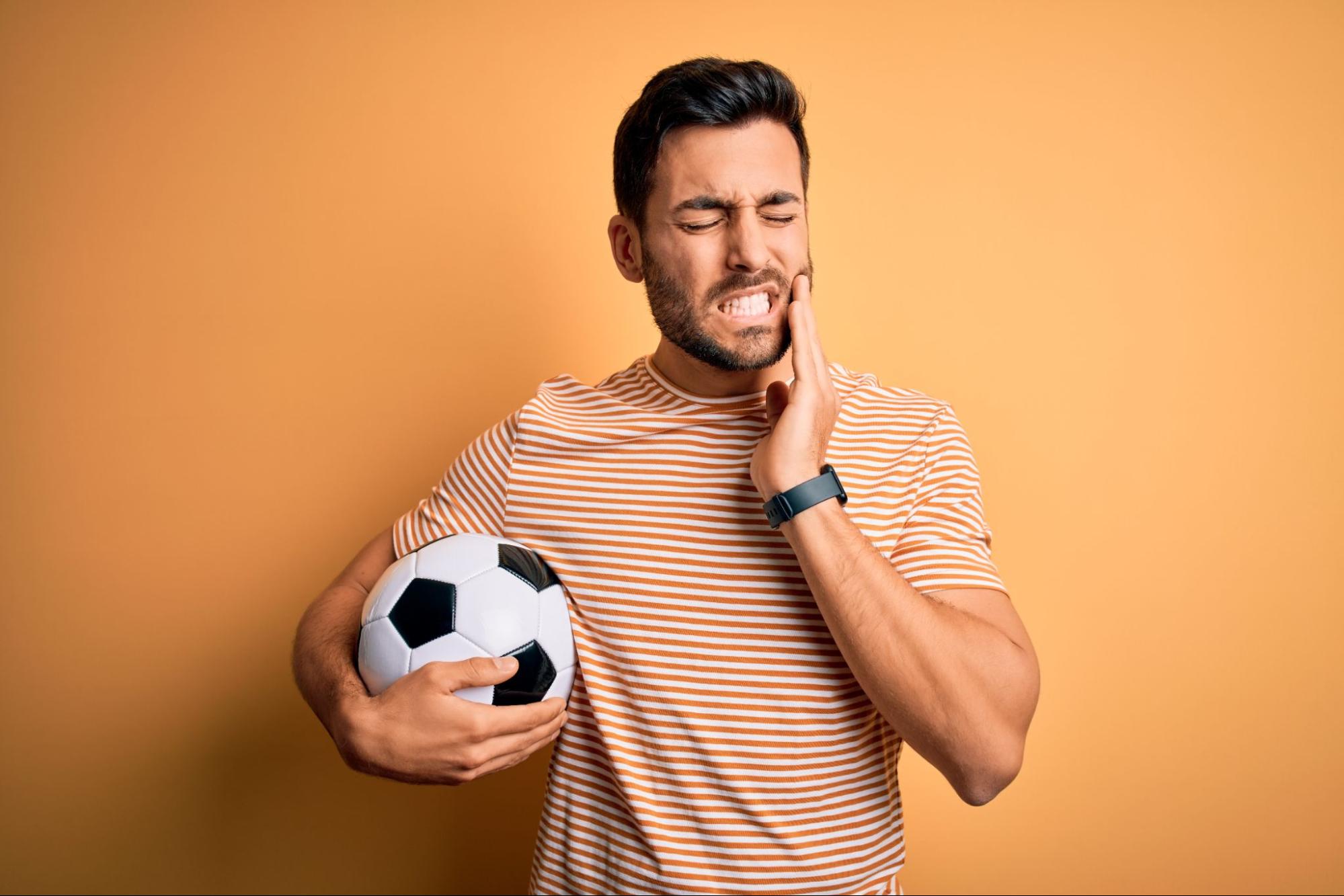5 Common Dental Injuries in Sports & Prevention Tips

Have you or your loved ones ever been in a situation where you have experienced trauma and pain from a dental injury in sports?
Studies have shown that approximately 4.5% of people worldwide experience dental injuries each year. About one-third are children and toddlers with primary teeth, and one-fifth are teenagers and adults with permanent teeth. Most of these numbers are from sports related injuries and falls.
Dental injuries in sports are surprisingly common and can leave lasting damage if not treated correctly. In such situations, timely action and an immediate visit to the dentist is the best thing to do as this will help alleviate pain and prevent further damage.
Whether you’re an avid sports enthusiast or a concerned parent, understanding the dental injuries that can occur during contact sports or accidents and learning how to prevent them is vital for maintaining oral health on and off the field. Read on to find more about sports related dental injuries, prevention tips and how to treat them if or when they happen.
5 Common Dental Injuries in Sports
Contact sports generally cause most of the dental injuries you see on the field. This usually happens during collisions with other players, contact with equipment, sports gear fails, or accidents.
Some of the most common dental injuries in sports include:
Fractured or chipped teeth
At Whitehorse Dental, the most frequent dental trauma we see is a chipped tooth. Tooth fractures or chips usually occur when a tooth breaks or chips due to a direct impact on the mouth. There are different types of fractures, including enamel fractures, where only the outer layer of the tooth is affected, and dentin fractures, which involve damage to the underlying layer of the tooth. In more severe cases, fractures can extend into the tooth’s pulp, which contains nerves and blood vessels. Symptoms may include pain, sensitivity to hot or cold temperatures, difficulty chewing, sharp edges on the affected tooth, or visible cracks or chips.
Avulsed (knocked out) teeth
Avulsed teeth happen when a tooth is completely displaced or knocked out from its socket. It may still be in the mouth but will shift due to a strong force or direct impact. This is one of the most serious dental emergencies and should be treated without delay.
A couple of things you can do if you have a knocked-out tooth include:
- Clean it from the crown side with milk or saline if dirty, avoiding the root, and insert it back into the socket immediately. Waiting too long can increase the risk of cell death.
- If the tooth is broken, collect the fragments and bring them in when you visit our emergency dentist.
- Find a way to stick the tooth, including the root, back in the socket, even if it is in the wrong position. This improves the chances of successful reimplantation.
- Always handle from the crown side, never from the root side as it can damage the nerves.
- Don’t try to put a baby tooth back in because it can disturb the area where the permanent tooth will erupt.
- Avulsions can cause facial or oral trauma and may bleed. Applying gentle pressure with a clean cloth or gauze helps control the bleeding and swelling. Be careful about disturbing a blood clot if it has formed in the socket as it helps with the healing process.
Luxated teeth
When a tooth hasn’t fallen out but only moved direction, it is called a tooth intrusion or a luxated tooth. The only difference is in the position of the tooth, sideways for a luxated tooth and intrusion for movement within the jawbone in which the tooth can be sunken in more than usual. Luxated teeth can cause pain, mobility, and misalignment and affect the overall bite and function of the affected tooth.
Soft tissue injuries
Soft tissue injuries to the lips, tongue, and cheeks are common occurrences in dental sports injuries. These injuries result from direct impact or trauma to the mouth and include cuts, lacerations, abrasions, bruises, or swelling to the cheeks, lips, and tongue. These types of injuries may sometimes need stitches to close the wound.
Jaw fractures and dislocations
A jaw fracture refers to a break or cracks in the jawbone, which can happen due to a forceful impact to the face or a direct blow to the jaw. Whereas, dislocation involves the displacement of the jaw joint (temporomandibular joint) that connects the jawbone to the skull. These injuries can cause severe pain, difficulty opening or closing the mouth, misalignment of the teeth, swelling, and bruising.
Prevention Tips for Dental Injuries in Sports
Dental injuries during sports usually have long-term consequences on the health and life span of the teeth. As such, prevention is key to protecting yourself. This can save your teeth from lasting damage and you from the pain and trauma that comes with any dental injury.
Common Sports Associated with Dental Injuries
- Rugby and football
- Boxing and martial arts
- Soccer
- Basketball
- Netball
Wearing a mouthguard
Dental injuries can happen in various sports, not just those traditionally associated with high contact. While sports like boxing, martial arts, and rugby are often more well-known for their potential for dental injuries, it’s important to note that dental trauma can occur in other sports as well. Even in sports like basketball, netball, and soccer, where physical contact may be less frequent, there is still a risk of accidental blows to the face from collisions or contact with balls. Wearing a professionally made mouthguard is a preventive measure that should be considered in most sports, regardless of which sport you are playing. A mouthguard provides protection and reduces the impact force, helping minimise the risk of dental trauma.
A custom-made mouthguard made to fit your teeth snugly can prevent and protect you from most types of dental injuries during sports. There’s less risk of it falling out or being dislodged, and the high-quality material and durability ensure it’s comfortable and made to last.
Seeking Prompt Treatment for Dental Injuries
Dental trauma and sporting injuries are not something that should be delayed. It is time sensitive and must be looked at by a dentist ASAP, as it helps ensure the best possible outcome. Delaying treatment for days or even hours may negatively impact your teeth or oral health. Immediate assessment by a dental professional allows for a thorough evaluation of the injury, pain management, and the prevention of further damage. Timely treatment reduces the risk of infection, preserving dental function and aesthetics, and enables early intervention for any complications that may arise. By getting emergency dental care, you can maximise your chances of a successful recovery and minimise the long-term impact of dental injuries.
Reliable Emergency Dental Care in Blackburn
Whether you need emergency dental care for sports-related injuries or general, children’s and cosmetic dental treatments, our friendly Blackburn dentists are here to help. With a range of dental procedures and treatments tailored to your unique needs in our state-of-the-art clinic, you can count on us for quality dental care and caring dentists who always put you first. Book an appointment today.



